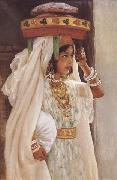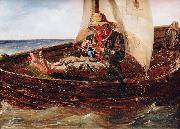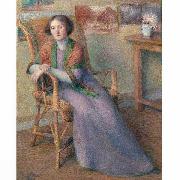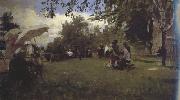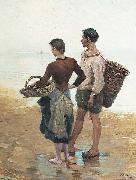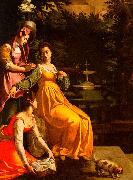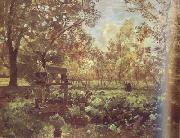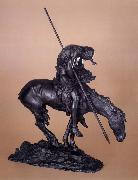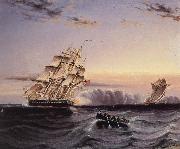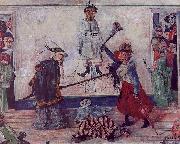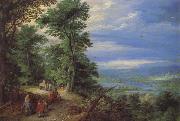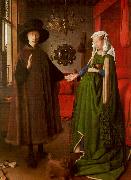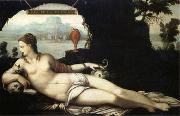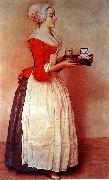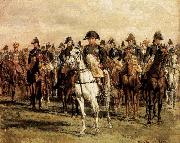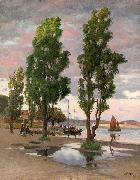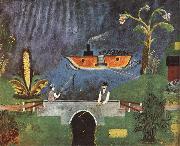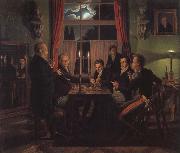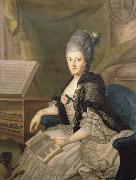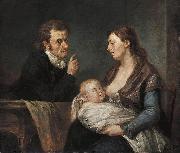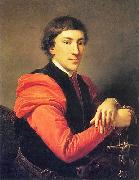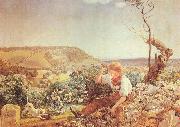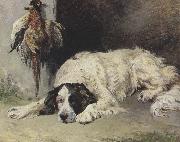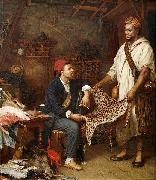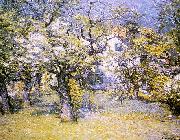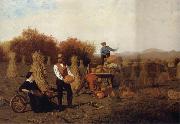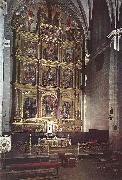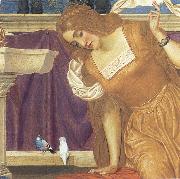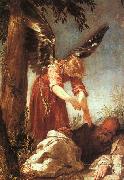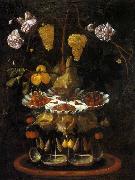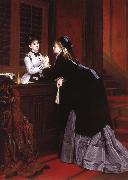|
|
 |
Henri Felix Emmanuel Philippoteaux
|
|
(1815-1884) was a French artist. He was born in Paris, France, studied art at the studio of Leon Cogniet,and first exhibited his work at the Paris Salon of 1833.
One of his most well-known works was a depiction of the Siege of Paris during the Franco-Prussian War, painted in the form of a cyclorama, a type of large panoramic painting on the inside of a cylindrical platform designed to provide a viewer standing in the middle of the cylinder with a view of the painting. Viewers surrounded by the panoramic image are meant to feel as if they are standing in the midst of a historic event or famous place.
Philippoteaux also produced a large number of works chronicling the rise and successes of Napoleon Bonaparte, including a portrait of Napoleon in his regimental uniform and a group of paintings of French victories in the Napoleonic Wars. Philippoteaux was awarded the Legion d'honneur in 1846.
Philippoteaux's son Paul Philippoteaux was also an artist; both were famous for their production of cycloramas. Father and son collaborated on The Defence of the Fort d'Issy in 1871. |
|
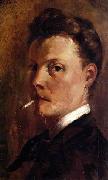 |
Henri-Edmond Cross
|
|
(May 20, 1856 - May 16, 1910) was a French pointillist painter.
Cross was born in Douai and grew up in Lille. He studied at the École des Beaux-Arts. His early works, portraits and still lifes, were in the dark colors of realism, but after meeting with Claude Monet in 1883, he painted in the brighter colors of Impressionism. In 1884, Cross co-founded the Societe des Artistes Independants with Georges Seurat. He went on to become one of the principal exponents of Neo-Impressionism. He began his Pointillist period after spending time with Paul Signac in 1904. His later works are Fauvist, perhaps influenced by his acquaintance with Henri Matisse.
His final years, plagued by rheumatism, were spent in Saint-Clair[disambiguation needed ], where he died in 1910. His pieces include The Church of Santa Maria degli Angely Near Assisi (1909) and Landscape with Stars.
The Allen Memorial Art Museum (Oberlin College, Ohio), the Block Museum of Art (Northwestern University, Illinois), The Art Institute of Chicago, the Fine Arts Museums of San Francisco, Harvard University Art Museums, the Hermitage Museum, the Honolulu Academy of Arts, Kröller-Meller Museum, the Los Angeles County Museum of Art, the Metropolitan Museum of Art, Museum of Grenoble (Grenoble, France), Musee d'Orsay (Paris), Musee Malraux (Le Havre, France), Musee Richard Anacreon (Granville, France), the Museum of Modern Art (New York City), the National Gallery of Art (Washington D.C.), New Art Gallery (Walsall, England), the Tel Aviv Museum of Art and the Thyssen-Bornemisza Museum (Madrid), are among the public collections holding works by Henri-Edmond Cross.
|
|
|
|
|
|
|
|
|
|
|
|
|
|
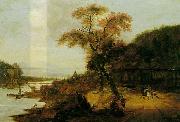 |
Jacob van der Does
|
|
(4 March 1623, Amsterdam - buried 17 November 1673, Sloten) was a Dutch Golden Age landscape painter.
Van der Does was the son of the secretary of the Amsterdam city council. He was more attracted to the arts than to note-taking, and went to study drawing with Claes Corneliszoon Moeyaert. He left at 21 to go to France, and from there on foot to Italy. In Rome he joined the Bentvueghels and was dubbed Tamboer, which means drummerboy, since he was somewhat short and had been meant for the military life. He studied with Pieter van Laer (Bamboots). When he eventually returned North, he settled in The Hague where he married Margaretha Boortens and got 4 sons and a daughter. His wife died in 1661. Houbraken liked his natural style of painting, and especially his way of painting sheep was very admirable.His wife's sister was Maria Boortens, and they both were good artists themselves. All three of them made drawings for the album of the wealthy Hague diplomat Cornelis de Glarges in 1659. Through Maria Boortens, Jacob van der Does was connected to Jacob van Campen and Adriaen van Nieulandt the younger. He became involved in the Guild of St. Luke in The Hague. He was one of the founders of the Confrerie Pictura in 1656. His pupils were Theodor Bernoille, Marcus de Bye, Gamaliel Day, Alexander Havelaer, Anthony Schinckels, and his sons Jacob II and Simon van der Does. |
|
|
|
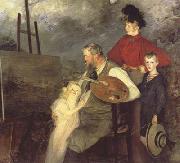 |
Jacques-Emile Blanche
|
|
(1 January 1861 - 20 September 1942) was a French painter born in Paris. His father was a successful psychiatrist who ran a fashionable clinic, and Blanche was brought up in the rich Parisian neighborhood of Passy in a house that had belonged to the Princesse de Lamballe. Although he received some instruction in painting from Henri Gervex, he may be regarded as self-taught. He became a very successful portrait painter, with a style derived from 18th-century English painters such as Thomas Gainsborough as well as Edouard Manet and John Singer Sargent. He worked in London, where he spent time from 1870 on, as well as Paris, where he exhibited at the Salon and the Sociate Nationale des Beaux-Arts. One of his closest friends was Marcel Proust, who helped edit several of Blanche's publications. He also knew Henry James and is mentioned in Gertrude Stein's The Autobiography of Alice B. Toklas. Among the painter's most famous works are portraits of his father, Marcel Proust (Private collection, Paris), the poet Pierre Louÿs, the Thaulow family (Musee d'Orsay, Paris), Aubrey Beardsley (National Portrait Gallery, London), and Yvette Guilbert.
He was the author of the unreliable Portraits of a Lifetime: the late Victorian era: the Edwardian pageant: 1870-1914 (London: J.M. Dent, 1937) and More Portraits of a Lifetime, 1918-1938 (London: J.M. Dent, 1939). |
|
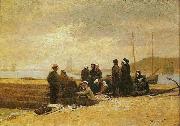 |
Jacques-Eugene Feyen
|
|
(1815, in Bey-sur-Seille, Meurthe-et-Moselle - 1908) was a French painter.
The elder brother of painter Auguste Feyen-Perrin, Jacques-Eugene enrolled at the Ecole des Beaux-Arts and studied under Paul Delaroche. He had a notable career at the Paris Salon from 1841 to 1882. Vincent Van Gogh was a fan of Feyen and describes him as, "one of the few painters who pictures intimate modern life as it really is, and does not turn it into fashion plates." He set up studio and settled in summer in the town of Cancale.He spent several months every year painting views of Cancale, the oyster-picking Cancalaises and the bay of Mont St. Michel, and his paintings still enjoy a steady fame.
|
|
|
|
|
|
|
|
|
|
|
|
|
|
|
|
|
|
|
|
 |
Jeles-Eugene Lenepveu
|
|
French Neoclassical Painter, 1819-1898.
Studied under François-Edward Picot. |
|
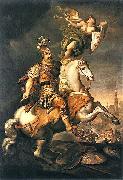 |
Jerzy Siemiginowski-Eleuter
|
|
(ca. 1660 - ca. 1711) was a prominent Polish painter and engraver of the Baroque, court painter of king John III Sobieski and a Polish-Lithuanian noble. He is considered one of the most accomplished painters of Classical Baroque in Poland, who joined in his works classical theory with genuine motives.
|
|
|
|
|
|
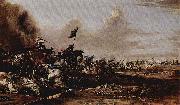 |
Johann Anton Eismann
|
|
(1604-1698) was an Austrian painter.
Eismann was born in Salzburg, and was active in Verona and Venice. He painted primarily harbor and some battle genre scenes. He died in Venice in 1698. |
|
|
|
|
|
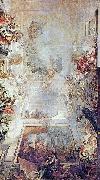 |
Johann Evangelist
|
|
Johann Evangelist Holzer (December 24, 1709 - July 21, 1740) was an Austrian-German painter.
Holzer was born in Burgeis, Mals, in the Vinschgau Valley of South Tyrol, as the son of a miller. He was sent to undertake a classical course of study at Marienberg Abbey, but wished to study art; a portrait he painted of Johann Baptist Murr, then the abbot of the abbey, convinced his father to yield to his wishes. He studied under Nikolaus Auer and made rapid progress. At the age of 18 he painted the altarpiece of the Marienberg Abbey church, depicting Saint Joseph as patron of the afflicted, ill, and dying. He then went to Straubing, where he learned under Joseph Anton Merz how to paint frescos, which would become the main source of his later fame. He helped Merz paint the frescos of Oberalteich Abbey, and while in Straubing also painted Saint Anthony of Padua for the Franciscan church there.
1738/39 was in the painting of Eichstätt for the high altar of the Schutzengelkirche It is Holzer's largest painting on canvas (H: 8,36 m; B: 4,28 m) and impresses through movement, gesture, a dynamic composition, and a sophisticated lighting design. Although there are two pictures (side altars) signatures of Bergmeller, they will Holzer, assigned by the archives occupied painter of the high altar painting. |
|
|
|
|
|
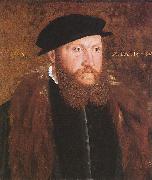 |
John Bettes the Elder
|
|
(active c. 1531 - 1570) was a Tudor artist whose few known paintings date from between about 1543 and 1550. His most famous work is his Portrait of a Man in a Black Cap. His son John Bettes the Younger, with whom he is sometimes confused, was a pupil of Nicholas Hilliard who painted portraits during the reign of Elizabeth I and James I.
Nothing is known of John Bettes's life, except that he was living in Westminster in 1556, according to a documented court case. He is first recorded as working for Henry VIII at Whitehall Palace in 1531. Queen Catherine Parr's accounts for 1546/47 record payments to Bettes for "lymning" (painting in miniature) the king's and queen's portraits, and for six other portraits. Her new year's gift of 1547 to Prince Edward was a pair of portraits of the king and herself. Bettes has been identified as the designer of the engraved title-border for William Cuningham's Cosmographical Glasse, printed by John Day in 1559. He may also be the designer of engravings for Edward Hall's Chronicle, published in 1550, and of a woodcut portrait of Franz Burchard, the Saxon ambassador to England, published in 1560. In 1576, John Foxe referred to Bettes as already dead. An earlier second edition of Foxe's Actes and Monuments printed in 1570 refers to Bettes' death. |
|
|
|
|
|
|
|
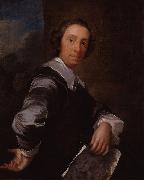 |
John Giles Eccardt
|
|
John Giles Eccardt (1720 - 1779) was a German-born British portrait painter. He came to England in the company of the French painter Jean-Baptiste van Loo for whom he worked as an assistant. When Van Loo departed the country, Eccardt remained and set up a portrait-painting business. In the following years he did portraits of a number of leading members of British society including twenty six of his chief patron Horace Walpole. He died in 1779. |
|
|
|
|
|
|
|
|
|
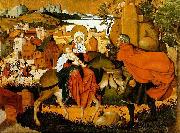 |
Jorg Breu the Elder
|
|
(c. 1475 -- 1537), of Augsburg, was a painter of the German Danube school. He was the son of a weaver.
He journeyed to Austria and created several multi-panel altarpieces there in 1500-02, such as the Melk Altar (1502). He returned to Augsburg in 1502 where he became a master. He travelled to Italy twice, in ca. 1508 and in 1514/15.
After his death in 1537, his son, Jörg Breu the Younger continued to lead his Augsburg workshop until his own death 10 years later. |
|
|
|
|
|
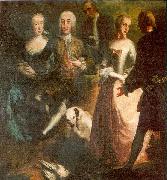 |
Joseph Esperlin
|
|
painted Engagement of Maria Josepha Grafin von Waldburg-Friedberg-Scheer (1731 - 1782) and her cousin, Prince Joseph Wenzel von Furstenberg (1728 - 1783) in 1748 |
|
 |
Joseph Heintz the Elder
|
|
the Elder (Basle, 11 June 1564 - near Prague, Bohemia, October 1609) was a Swiss painter, draftsman and architect.
He appears to have been a pupil of Hans Bock, and to have educated himself by diligent practice in copying the works of Hans Holbein the younger. Between 1585 and 1587 he lived in Rome, registering himself a pupil; to Hans von Aachen. He next settled in Bohemia in 1591, and was at once appointed court painter to Rudolf II, but he remained in Prague for two years only, as in 1593 he was commissioned to make some copies from the antique for the emperor, and for that purpose went to Rome, where he spent some years. In 1604 we hear of him in Augsburg, and from the time we know little of his history, until his decease is recorded in a village outside of Prague.
Heintz's paintings included religious images, portraits, and, following the emperor's taste, erotic mythological themes. They were at one time in high demand, but later on suffered an eclipse. Among them are a family portrait in Berne and that of Rudolf II in Vienna. He was constantly investigating subtle questions of light, and almost all of his landscapes show the interest he took in this technical matter. A notable work by him is the Rape of Proserpine, which hangs in the Dresden Gallery, and was engraved by Lukas Kilian; in the same gallery are two other works, Lot and His Daughters and Ecce Homo. Finally there is his portrait of Constance of Austria. He had a son, who bore the same name, and who painted a few religious pictures; several of these works hitherto attributed to the son are now believed to be late productions by the father.
|
|
|
|
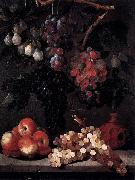 |
Juan Bautista de Espinosa
|
|
(1590-1641, Madrid) was a Spanish still life painter.
More paintings remain of him than biographical data and there is only one known painting remaining.
It is only known that he worked in Toledo and Madrid from 1612 to 1626 and, judging by his style, he was trained in Holland. De Espinosa's style is judged to be the transition from Flemish Baroque to Spanish Baroque.
Several mural paintings in Spanish churches are also attributed to him; one of these is in Alcaudete.
|
|
|
|
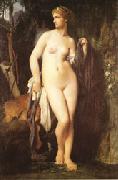 |
Jules Elie Delaunay
|
|
Nantes 1828 - Paris 1891.
French Neoclassical Painter.
Studied under Hippolyte Flandrin. |
|
|
|
|









